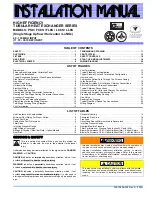
_______________________________________________________________________________________________________________________________
European Safety Systems Ltd.
Impress House, Mansell Road, Acton, London W3 7QH [email protected] Tel: +44 (0)208 743 8880
www.e-2-s.com Fax: +44 (0)208 740 4200
Document No. IS 2446-P Issue C 23-04-10
Sheet 5 of 6
the pcb. For maximum output level the potentiometer should
be set to the fully clockwise position.
16)
Flash Pattern Selection and 2nd & 3rd Stages
The BExCS110-L1D LED beacons have 9 different flash
patterns including one ON state that can be selected for the
first stage. They can then be remotely switched to second
and third stage flash patterns. The flash patterns are selected
by pin headers on the pcb for both DC and AC units. The
table on page five shows the pin header positions for the nine
flash patterns and which patterns are available for the second
and third stages. To operate the led beacon on stage one
simply connect the supply voltage to the normal supply
terminals (+ve and –ve for DC units, L and N for AC units).
The operation of the second and third stages is different for
DC and AC units.
DC Units Second and Third Stage Selection
To change to the second stage flash pattern, simply connect
a -ve supply line to terminal S2, while maintaining the dc
supply to the +ve and –ve terminals. Similarly for the third
stage flash pattern, connect a -ve supply line to terminal S3.
The supply line to the S3 terminal will automatically override
a supply to the S2 terminal.
AC Units Second and Third Stage Selection
To select the second and third stage flash patterns on the
BExCS110-L1D AC beacons the Common (C) terminal on
the three way terminal block on the pcb is connected to the
S2 terminal for the second stage tone and the S3 terminal for
the third stage tone.
Flash Pattern Table
Stage 1
LED
Stage 2
Stage 3
Pattern
Flash Pattern
Pattern Pattern
1
ON
9
8
2
Rotating 3 LED on Fast
7
1
3
Rotating 6 LED on Fast
8
1
4
Rotating 3 LED on Slow
9
1
5
Rotating 6 LED on Slow
6
1
6
Double strike strobe 1 Hz
9
1
7
Single strike strobe 2 Hz
3
1
8
Double strike strobe 2 Hz
3
1
9
Alternate side flash 1:1 2 Hz
3
1
PIN HEADER POSITIONS
Pattern No. 1
Pattern No. 2
Pattern No. 3
Pattern No. 4
Pattern No. 5
Pattern No. 6
Pattern No. 7
Pattern No. 8
Pattern No. 9
Pattern Selection
Pin Headers
P
C
B
E
d
g
e
17)
Line Monitoring (DC Units)
On BExCS110-L1D DC units, dc reverse line monitoring can
be used if required. All DC units have a blocking diode fitted
in their supply input lines on both the sounder section and the
LED beacon section. An end of line monitoring diode or an
end of line monitoring resistor can be connected across the
+ve and –ve terminals. If an end of line resistor is used it
must have a minimum resistance value of 3k3 ohms and a
minimum wattage of 0.5 watts or a minimum resistance value
of 500 ohms and a min. wattage of 2 watts. If the sounder
and beacon sections are wired to separate power supplies,
then an end of line monitoring component can be used in
each section.
TONE SELECTION TABLE
Tone Selection
DIP Switch
Settings
Stage Selection
Stage 1
Frequency Description
1 2 3 4 5
Stage 2
Stage 3
1
Continuous 1000Hz
Toxic gas alarm
0 0 0 0 0
Tone 31
Tone 11
2
Alternating 800/1000Hz at 0.25s
intervals
1 0 0 0 0
Tone 17
Tone 5
3
Slow Whoop 500/1200Hz at 0.3Hz
with 0.5s gap repeated
0 1 0 0 0
Tone 2
Tone 5
4
Sweeping 800/1000 at 1Hz
1 1 0 0 0
Tone 6
Tone 5
5
Continuous at 2400Hz
0 0 1 0 0
Tone 3
Tone 27
6
Sweeping 2400/2900Hz at 7Hz
1 0 1 0 0
Tone 7
Tone 5
7
Sweeping 2400/2900Hz at 1Hz
0 1 1 0 0
Tone 10
Tone 5
8
Siren 500/1200/500Hz at 0.3Hz
1 1 1 0 0
Tone 2
Tone 5
9
Sawtooth 1200/500Hz at 1Hz
0 0 0 1 0
Tone 15
Tone 2
10
Alternating 2400/2900Hz at 2Hz
1 0 0 1 0
Tone 7
Tone 5
11
Intermittent 1000Hz at 0.5Hz
General alarm
0 1 0 1 0
Tone 31
Tone 1
12
Alternating 800/1000Hz at 0.875Hz
1 1 0 1 0
Tone 4
Tone 5
13
Intermittent 2400Hz at 1Hz
0 0 1 1 0
Tone 15
Tone 5
14
Intermittent 800Hz 0.25s on 1s off
1 0 1 1 0
Tone 4
Tone 5
15
Continuous at 800Hz
0 1 1 1 0
Tone 2
Tone 5
16
Intermittent 660Hz 150mS on,
150mS off
1 1 1 1 0
Tone 18
Tone 5
17
Alternating 544Hz
(100mS)/440Hz(400mS)
0 0 0 0 1
Tone 2
Tone 27
18
Intermittent 660Hz 1.8s on, 1.8s off
1 0 0 0 1
Tone 2
Tone 5
19
1400Hz to 1600Hz sweep up over
1s - 1600Hz to 1400Hz sweep down
over 0.5s
0 1 0 0 1
Tone 2
Tone 5
20
Continuous 660Hz
1 1 0 0 1
Tone 2
Tone 5
21
Alternating 554/440Hz at 1Hz
0 0 1 0 1
Tone 2
Tone 5
22
Intermittent 554Hz at 0.875Hz
1 0 1 0 1
Tone 2
Tone 5
23
800Hz pulsing at 2Hz
0 1 1 0 1
Tone 6
Tone 5
24
Sweeping 800/1000Hz at 50Hz
1 1 1 0 1
Tone 29
Tone 5
25
Sweeping 2400/2900Hz at 50Hz
0 0 0 1 1
Tone 29
Tone 5
26
Simulated bell sound
1 0 0 1 1
Tone 2
Tone 1
27
Continuous 554Hz
0 1 0 1 1
Tone 26
Tone 5
28
Continuous 440Hz
1 1 0 1 1
Tone 2
Tone 5
29
Sweeping 800/1000Hz at 7Hz
0 0 1 1 1
Tone 7
Tone 5
30
420Hz repeating 0.625s on, 0.625s
off
Australian alert signal
1 0 1 1 1
Tone 32
Tone 5
31
1200/500Hz at 1 Hz
Prepare to abandon platform
0 1 1 1 1
Tone 11
Tone 1
32
Sweeping 500/1200Hz 3.75s on,
0.25s off 15Hz
1 1 1 1 1
Tone 26
Tone 1
























